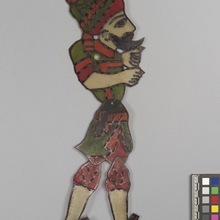Shadow Puppet
MOA: University of British Columbia
3364/2
Shadow puppet, Hacivat, made of semi-transparent animal skin and a watery paint or dye, soaked into the skin. The puppet body and legs are separate pieces, tied together with a thin plastic cord through small holes. The figure is a male, wearing red short pants, with a green, red and orange tunic and hat, and red shoes with rectangular buckles. His one hand is under his beard; his other arm crosses the body so the hand is just below the other hand. He has a black pointed beard and a mustache. The main hole for the stick (to manipulate the puppet) is in his upper chest area. The maker's name is written along the back of one leg.
-
Iconographic Meaning
The puppet represents one of the main characters, Hacivat.
-
History Of Use
Shadow puppet character, from the Turkish shadow play known as "Karagöz & Hacivat". The play dates back to the Ottoman Empire (c. 1299-1923). It follows the escapades and fights of the two central characters from whom it takes its name. These friends are opposites in many ways: Karagöz (Black Eye) is illiterate and coarse, but well-intentioned, and very funny. Whereas Hacivat is pretentious and conceited, well-spoken and amusing. The plays are full of wit and satire and social and ethnic stereotypes as well as supernatural characters, such as monsters and magicians. Karagöz shadow puppetry was inscribed on UNESCO’s List of the Intangible Cultural Heritage of Humanity in 2009.
- Type of Item puppet
- Culture Turkish
- Material animal skin, paint, plastic
- Measurements height 35.0 cm, width 10.5 cm, depth 1.0 cm (overall)
- Creator Ercan Aksakal
- Previous Owner Consulate General of the Republic of Turkey
- Received from Consulate General of the Republic of Turkey
- Made in Bursa
- Creation Date during 2019
- Ownership Date before May 17, 2019
- Acquisition Date on May 17, 2019
- Condition excellent
- Accession Number 3364/0002
